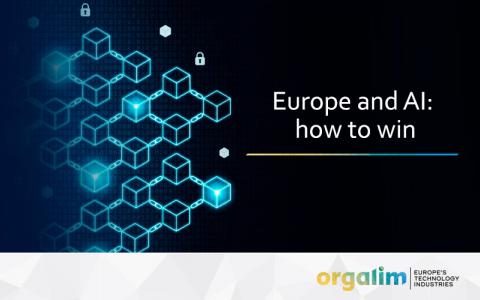Europe and AI: how to win
14 February 2020
In this Insight post, Orgalim manager Pierre Lucas shares insights on the work of the European Commission’s ‘High Level Expert Group on AI’ and how the EU can boost its position in the global AI race.

Two-thirds of the value generated by artificial intelligence is contributable to the B2B segment. This is excellent news for Europe and for its technology industries in particular. But is this sufficient to take the lead in the global AI race?
As a member of the European Commission’s ‘High Level Expert Group on AI – or HLEG AI’, this has been at the core of the debate we had at European level; drawing on that experience, I’d like to share some of the key elements that will, in my opinion, help us build on our strengths and boost our global position.
Valid concerns – focus on our strengths
Europe’s approach towards AI has been dominated by two factors – the fear of being left behind by our main global competitors and its potential impact.
Though these are valid points, Orgalim, Europe’s Technology Industries, wants to contribute to the debate by focusing on what AI as a technology can bring to Europe’s economy and society as a whole. With our Manifesto for a European Agenda on Industrial AI we aim to do just that.
Europe’s technology industries have used AI for many years at the factory level. The whole ‘Industry 4.0 vision’ has integrated AI as one of the key technologies to be deployed to succeed globally in industry’s digitalisation.
But the gamechanger has been key advances in computing power – the availability and explosion of data and the ability to create new algorithms. This has made AI even more relevant for companies to develop new business models and applications and move from the orientation to the deployment phase. Certainly, AI provides productivity gains; but it also generates new and better products and services in areas such as healthcare, farming, factory automation, energy generation and transport, smart cities and smart transportation, materials and waste management. All these areas contribute to the “European Green Deal” and “An economy that works for people” – two of the new European Commission Political Guidelines.
Building on our industrial base – building an EU AI strategy
Europe’s strengths lie with its very strong industry base, which is generating an exponential increase of data via connected devices, but also depending less and less on the cloud. This second aspect will soon become an asset for Europe, provided that conditions are well formulated, and companies can develop a very fruitful data sharing environment, creating new business opportunities. These conditions are explained in a recent position paper prepared by Orgalim on a ‘European Data Space for Smart Manufacturing’.
Nevertheless, much remains to be done: too many companies in more traditional sectors have not yet embraced the potential of AI for their development, too much of the workforce still lacks the proper education to contribute to this development, and too many European citizens lack the information to build a reasoned opinion on AI.
To reach the required critical mass, any effective strategy on AI must be developed between the EU and its Member States, together with as many as possible of its close neighbours . The good news is that the new European Commission is fully determined to continue and accelerate the work undertaken by its predecessor, and to strongly link the AI, data and cybersecurity dossiers as part of a new Digital Strategy.
I believe that the EU AI strategy should be built on three pillars; namely, a regulatory framework, additional public investments and building customers’ trust. Together, these can position Europe as a global leader for citizen and consumer-accepted AI.
a) a regulatory framework based on the ‘acquis’ of the EU Internal Market that has granted the free circulation of goods and services while respecting the highest safety standards and providing a solid product liability regime. We also need a flexible legal regime which regulates the sharing of industrial data.
b) a massive push for private and public investments that should be devoted to fundamentally upgrading all Europeans’ digital skills; building infrastructures (broadband and cybersecurity), pushing R&D and Innovation, and fostering the penetration of AI via efficient technology transfer and low threshold access to technology in the public services, all sectors of industry and companies of all sizes.
c) Clearly, both these topics are priorities. But for me, the most important element is gaining public trust in AI solutions. This requires action on at least three levels: companies should apply ethics to reinforce customers’ trust (using for example the EU Ethics Guidelines drafted by the High Level Expert Group on AI once it has been transformed into a practical management tool); the full deployment of the Cybersecurity Act (at Orgalim we have developed a set of seven principles in our recent Cybersecurity position paper); awareness-raising campaigns aimed at the workforce and citizens at large should be organised to provide unbiased and informed arguments on AI, particularly as regards the destruction or creation of jobs or the spectre of a takeover by intelligent machines.
In the HLEG AI, we have focused strongly on the ability of Europe to develop and roll out ‘Trustworthy AI’. Europe has many resources to compete in the global AI technology race. Supported by well-informed and critical citizens, by a well-trained workforce, and by EU and national policymakers working in a coordinated manner, European technology industries will continue to develop products and services that contribute to their global competitiveness.
I am convinced that, with the right framework, Europe can not only strengthen its position but also take the lead in AI, especially in the B2B space.
